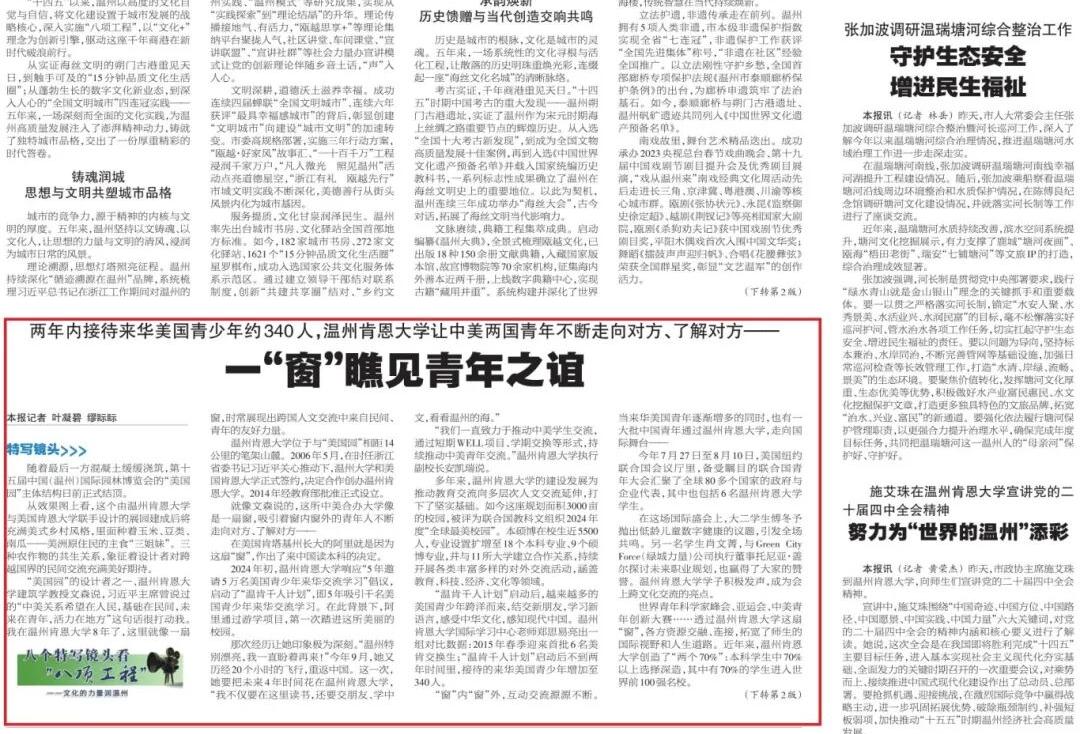
Bo Zhang, Ph.D.
-
Position:Associate Professor of Biology
-
College:College of Science, Mathematics and Technology
-
Office:CSMT 422
Education
Ph.D. in Genetics, Institute of Genetics and Developmental Biology, Chinese Academy of Sciences
Biography
- Associate Professor (2025–Present)
Wenzhou-Kean University (WKU), Wenzhou, China
- Assistant Professor (2019–2025)
Wenzhou-Kean University (WKU), Wenzhou, China
- Program Manager (2018–2019)
Mount Vernon Pipeline to College Partnership Program with Lehman College, City University of New York, NY, USA
- Research Assistant Professor / Adjunct Assistant Professor (2011–2019)
Lehman College, CUNY, NY, USA
Courses Taught: General Biology, Microbiology, Genetics, Experimental Microbiology
- Adjunct Assistant Professor (2017–2019)
Mercy College, NY, USA
Courses Taught: General Biology, Microbiology, Genetics
- Postdoctoral Researcher (2010–2011)
Georgia Institute of Technology, Atlanta, GA, USA
Courses Taught
- General Biology (BIO1000, BIO1400)
- Foundations of Environmental Science (ENV1100)
- Microbiology (BIO3315 & BIO3315L Zhejiang Provincial First-Rate Course 浙江省一流课程)
- Cell Biology (BIO4236)
- Capstone Course: Seminar in Integrative Biology (BIO4970)
- Molecular Biology of Cancer (STME5310)
- Advanced Molecular & Cellular Techniques (STME5170)
Research interests
Rho-Pol II Signaling in Eukaryotes
Our research has uncovered a novel, highly conserved Rho-Pol II signaling pathway in eukaryotes. Although Rho GTPases—including Rho, Cdc42, Rac, and the plant-specific ROP subfamilies—are extensively recognized for cytoskeletal regulation, we have established their pivotal role as direct regulators of RNA polymerase II (Pol II)-mediated transcription. Our findings demonstrate that cell morphogenesis is predominantly governed by the phosphorylation status of the Pol II C-terminal domain (CTD), with alterations in CTD phosphorylation significantly impacting cell morphology. We are currently identifying the key factors that maintain the balance between transcriptional regulation and cellular morphology.
*We are seeking motivated undergraduate students with an excellent GPA and a passion for molecular and cell biology, signal transduction, genetics, biochemistry, and/or bioinformatics.
Host-Microbe Interaction
- Pathogenesis of Atopic Dermatitis (AD)
AD is a chronic inflammatory skin disorder that affects millions worldwide. Our research focuses on:- The Role of Microbes in AD Pathogenesis: Building on a discovery from the BIO3315L course, we have identified novel bacterial species beyond Staphylococcus aureus correlated with AD and are investigating their mechanisms using cell-based models.
- Filaggrin Mutations and Dysregulation: This concluded research direction, conducted entirely by WKU undergraduates, has yielded two manuscripts and one patent currently under review.
- RSI Invasion Switch
The α-Proteobacteria RSI invasion switch is critical for the invasion and symbiosis processes of Agrobacterium, Rhizobium, Brucella, and Bartonella. This project, initiated at MIT and conducted in collaboration with Prof. Haiping Chen (CUNY), focuses on the ExoR protein for detailed biochemical and in vivo studies. Research progress has been driven specifically by undergraduate researchers.
*The project is open to undergraduate students with a GPA above 3.0 and a deep interest in microbiology, genetics, biochemistry, and bioinformatics.
Lab Student Awards
- National Third Prize, 8th National Life Science Competition (Chen Chen, Jinyang Jiang, Qizhen Zhong; 2023)
- Zhejiang Provincial Third Prize, 8th National Life Science Competition (Shiqi Jin, Xindi Zou, Keshuo Luo, Ziyu Zhang, Bingyan Yuan; 2023)
- Best Oral Presentation Award, WKU Student Research Day (Chen Chen & Jinyang Jiang, 2023; Zhonghao Chen & Shiqi Jin, 2022; Changyi Sun, 2021)
Selected Publication
Research Publications from WKU
- Zhou, Z., Chen, Z., Li, Y., Mao, X., Chen, J., Zhou, X., & Zhang, B*. (2025). Advances in solubilization and stabilization techniques for structural and functional studies of membrane proteins. PeerJ, *13*, e19211. (*Corresponding author; Undergraduate Research; CAS Tier 3)
- Chen, C., Zhou, X., Jiang, J., Zhong, Q., Jin, S., Kastrat, E., ... Zhang, B*. (2025). Genetic diversity and functional insights of nattokinase variants in Bacillus. Journal of Future Foods, (in press). (*Corresponding author; Undergraduate Research; CAS Tier 1 TOP)
Educational Research from WKU
- Zhou, X., & Zhang, B*. (2024). Zhou, X., & Zhang, B. (2024). Enhancing Microbiology Laboratory Course: A Practical Approach to Project-Based Learning via Skin Bacteria Analysis. The American Biology Teacher, 86(8), 526-528. (*Corresponding author)
- Zhou, X., Xu, Y., Zeng, Y., X., & Zhang, B*. (2024). Revamping of microbiology laboratory teaching in universities through project-based learning. Microbiology China, *51*(4), 1281-1289. (*Corresponding author)
Other Publications
- Zhang, B., Zhong, X., Sauane, M., Zhao, Y., & Zheng, Z. L. (2020). Modulation of the Pol II CTD phosphorylation code by Rac1 and Cdc42 small GTPases in cultured human cancer cells and its implication for developing a synthetic-lethal cancer therapy. Cells, *9*(3), 621.
- Zhang, B., Yang, G., Chen, Y., Zhao, Y., Gao, P., Liu, B., … & Zheng, Z. L. (2016). C-terminal domain (CTD) phosphatase links Rho GTPase signaling to Pol II CTD phosphorylation in Arabidopsis and yeast. Proceedings of the National Academy of Sciences, *113*(50), 201605871.
- Zhang, B., Pasini, R., Dan, H., Joshi, N., Zhao, Y., Leustek, T., & Zheng, Z. L. (2014). Aberrant gene expression in the Arabidopsis SULTR1; 2 mutants suggests a possible regulatory role for this sulfate transporter in response to sulfur nutrient status. The Plant Journal, *77*(2), 185-197.
- Wuriyanghan, H.#, Zhang, B.#, Cao, W. H.#, Ma, B., Lei, G., Liu, Y. F., … & Chen, S. Y. (2009). The ethylene receptor ETR2 delays floral transition and affects starch accumulation in rice. The Plant Cell, *21*(5), 1473-1494. (# Co-first author)
Presentations
- Bo Zhang, “Roles of a protein kinase gene in plant ethylene response and stress responses in Arabidopsis” (2009 NAIST Global COE International Student Workshop and GCOE International Symposium, 2009, Japan.)
- Bo Zhang, “Arabidopsis NIMA-related Kinase Regulates Organ Size and Stress Tolerance and Interacts with Ethylene Signaling” (Peking University, 2010, China)
- Bo Zhang, “Rho GTPase, a Smart Regulator Beyond Cytoskeleton” (Wuhan University, 2017, China)
- Bo Zhang, “C-terminal domain (CTD) phosphatase links Rho GTPase signaling to Pol II CTD phosphorylation in Yeasts, Arabidopsis and Human” (Huazhong Agricultural University, 2017, China)
College Programs
- B.S. Chemistry
- B.S. Environmental Science
- B.S. Biology (Cell and Molecular Biology Option)
- B.A. in Mathematical Sciences (Data Analytics Option)
- B.S. Computer Science




